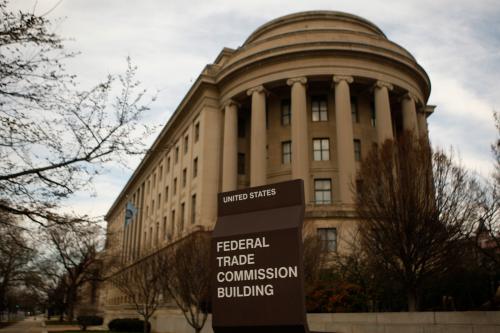It seems that every year brings news of an attempted merger between giant corporations. This year begins with the ongoing saga of AT&T attempting to take over Time Warner, and with it come important questions about declining competition in the modern American economy.
Our paper, “A policy at peace with itself: Antitrust remedies for our concentrated, uncompetitive economy,” shows why antitrust has become an object of public concern and documents the urgent need to reform antitrust enforcement, which has failed, in recent years, to stem rising concentration and prevent declining competition.
Multiple analyses, relying on different measurements of concentration, document a steady and significant increase in consolidation. In addition, evidence points to rising market power and threats to competition. Not only are today’s firms astoundingly profitable, they are persistently profitable. While a profitable American firm in the 1990s had a 50 percent chance of finding itself similarly successful 10 years on, a very profitable American firm today enjoys over an 80 percent chance. That persistently high profits remain unchallenged suggests many firms may be receiving a return on market power.
Today’s lackluster start up activity and business sector underinvestment also point to insufficient competition. As rivals fail to displace incumbents, the market position of dominant firms becomes more entrenched.
The need to reinvigorate antitrust law and enforcement becomes particularly clear in light of the economy-wide consequences of the approach that has characterized the American antitrust regime for the past forty years.
Under-enforcement has harmed consumers as many mergers have led to higher prices. Declining competition has also resulted in rising inequality as inter-firm earnings disparities deepen the economic divide among workers. Falling start up formation also has stark implications for American workers. The share of U.S. employment accounted for by young firms over the last 30 years has dropped by 30 percent.
Throughout its history, American antitrust policy has been subject to multiple interpretations whose goals have included preserving local businesses, protecting consumers and small producers against the superior market power of large corporations, and safeguarding the competitive process. But in the late 1970s, antitrust jurisprudence and enforcement adopted a framework, chiefly advocated by former Solicitor General Robert Bork, which eliminated the qualitative and pluralist dimensions of antitrust enforcement.
In the four decades since the adoption of this framework, new concerns have arisen about the consequences of growing corporate concentration, including increased inequality, decreased entrepreneurship, and the concentration of economic growth into a small number of geographical areas.
This set of issues has inspired renewed conversation on the basis of antitrust enforcement. While conservatives invoke a total welfare standard that regards efficiency-enhancing mergers as presumptively legitimate, progressives’ broader understanding of consumer welfare encompasses quality and innovation in its antitrust concerns. Recently, a third stance has entered the fray. Populists regard the consumer welfare standard as inadequate because it pays no attention to the threat corporate power poses to democratic institutions.
While the populists offer a plausible account of the historical record, the need to craft clear, predictable rules and to rebuild support for vigorous enforcement inclines us toward the progressive approach. In this vein, our paper offers four reforms the current antitrust regime should adopt.
- First, the antitrust agencies should reinvigorate the structural presumption and tighten the enforcement standards for horizontal mergers. This includes lowering the threshold at which prospective mergers are subject to rigorous scrutiny as well as encouraging the agencies to reverse mergers if evidence emerges showing anticompetitive effects.
- Second, the agencies should update the Non-Horizontal Merger Guidelines to reflect current understanding that vertical integration can have anti-competitive effects. Updated Guidelines should acknowledge that behavioral remedies are often inadequate and offer structural remedies as a substitute when needed.
- Third, U.S. antitrust enforcement needs a new regime to deal with predatory pricing. Currently, American antitrust has few tools to wield against exploitation.
- Fourth, the costs of antitrust enforcement should be reduced. This would include reinstating a rule that has allowed automatic appeals of district courts’ antitrust decisions to the Supreme Court.
These proposals would not require a radical re-thinking of the purposes and enforcement of antitrust legislation. As such, they should enjoy consensus and implementing them would present no insuperable obstacles.







Commentary
The consequences of increasing concentration and decreasing competition—and how to remedy them
January 5, 2018